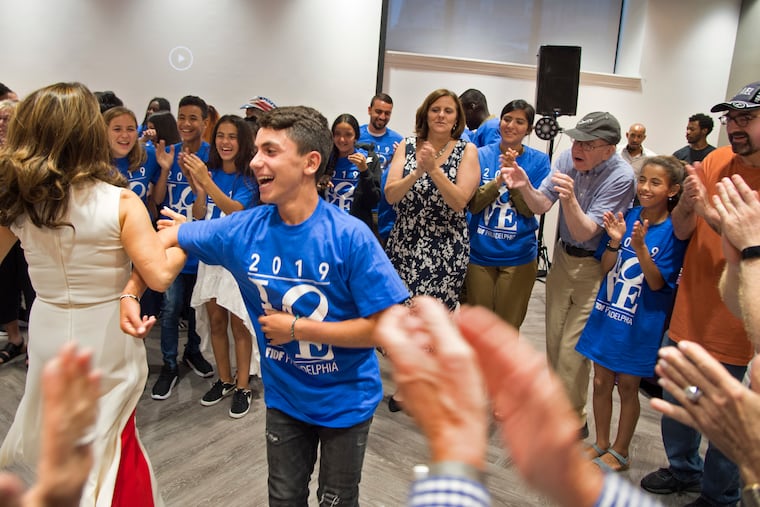Israeli children, dealing with deaths in the family, had a ceremonial bar and bat mitzvah of a lifetime in Montco
The 26 teens, celebrating at a communal bar and bat mitzvah party in a Philadelphia suburb, said that highlights of their summer trip to the U.S. included Hersheypark and meeting American campers.

It sounds like a dream summer for 26 Israeli youths: spending 10 days swimming, playing sports, and meeting U.S. teens at a Jewish camp in Franklin County and visiting Hersheypark. Wednesday evening, they capped their time in Pennsylvania with a ceremonial bar mitzvah and bat mitzvah party in Bala Cynwyd.
That night, the children gushed in Hebrew about their time in America. Tehila Shiloni, 12, of Modiin, said the best part was Hersheypark. Shaked Shuker, 13, of Ra’anana, agreed.
Ilay Keinan, 13, of Gedera, said his favorite part of the trip was the camp lake; Roee Hadad, 13, of Be’er Sheva, said being with Americans was “an unforgettable experience.” And Shir Elmakias, 12, from Netanya, allowed how “it was a little strange to meet American campers. ... But it was very fun to speak with them.”
What made the Israeli children different from the American campers? Each of the visitors had lost a sibling or a parent serving in the Israeli Defense Forces (IDF).
Shiloni’s brother, Almog, was killed at age 20 in a stabbing attack in November 2014; Hadad’s brother, Shachar, died in a car accident at age 19; Keinan’s sister, Koral, was killed while serving at age 22; and Shuker’s brother, Ofir-David, died in an accident at age 21 in 2016. Elmakais’ brother, Shlomo, died on an IDF mission.
These children are part of Legacy Camp, a program run by the New York-based nonprofit Friends of the Israel Defense Forces (FIDF), which provides resources to active and former soldiers. Its Pennsylvania and South Jersey chapter opened in 2011. (The national group is one of a large group of defendants in a lawsuit filed by Palestinian plaintiffs alleging support of war crimes.)
Tzvia Wexler, executive director of the local chapter, said, “In Israel, everybody is crying the same cry," a reference to how common it is for Israelis to have had a loved one killed in the ongoing Middle East conflict. “When we talk about [losing family] in Israel, we’re all talking the same language.”
Yishai Va’anunu, a 13-year-old camper from Ashdod, said during Wednesday’s event that one night in 2014, he was about to leave home with his grandfather when he saw three officers standing next to the house. Shakily, he recalled how his family was told that his brother, Ben Yitzchak, had been killed in the conflict with Gaza.
There is a difference in how grief is experienced in Israel compared with the United States, according to Brandeis University professor and Israel expert Shayna Weiss. “In Israel, grief is a communal experience,” she said, citing Israel’s nationwide Memorial Day, in which the entire country observes a moment of silence. “In America, grief is more individual.”
The camp’s counselors are active IDF soldiers who also have lost family. One of them, Abas Abo Agina, 24, is a Bedouin soldier whose father was killed during military activity in 2002. He helps translate for the children who speak only Arabic.
This is his first visit to the United States. “To be in a place [like America] ... it’s like a dream,” he said.
The group also includes two Bedouin campers and one counselor, as well as a Druze camper.
“In bereavement, we are not dividing” between groups, said Irit Kolback, who helps coordinate the Legacy program from her Tel Aviv office.
Wexler said this is the first time FIDF held a communal party like this, so both the campers and donors to the program could participate.
“It seems like it’s really a good event, a big event.... They’re not joking around with us,” Hadad said as about 50 adults chatted with friends and the children before speeches began.
One attendee honored during the evening’s remarks was Barbara Brodsky of Bala Cynwyd, a supporter of both FIDF and Jewish Family and Children’s Service (JFCS) of Greater Philadelphia. The party was hosted at JFCS’s Enrichment Center, named for her and her husband, Harvey.
The event “is an honor for us,” she said. "I’m delighted to be a part of it.”
The Legacy camp is part of a broader FIDF program supporting families who have lost relatives in the IDF. It’s one of many programs supporting bereaved families in the region, including the Parents Circle-Families Forum, which supports both Israelis and Palestinians who have lost family members in violence.
During the evening’s remarks, community member Israel Roizman pledged to donate $36,000 to FIDF, while a local couple gifted the children with T-shirts depicting the Philly “LOVE” sign.
Soon the children came to the front of the room, standing around a giant birthday cake with 12 candles. After a few candles were lit by FIDF donors, Wexler announced that the next would be lit in memory of soldiers who died in military service.
A few campers at a time lit candles as Wexler announced the names of loved ones who had died in service. A few campers smiled while lighting; others began to cry or stepped out of the room, into the arms of counselors.
Once all of the candles were lit, the group gathered around the cake in a semicircle and blew out the candles, and then the celebration started in earnest.
The kids and the donors danced together while the DJ played tunes ranging from classic bar-mitzvah fare like “Hava Nagila” to modern Israeli pop ballads like “Tel Aviv.”
For what Wexler said was the final song, the children, soldiers, and donors joined in a circle to sing a a chorus of “Od Yavo Shalom Aleinu" — “peace will yet come to us.”